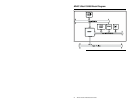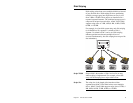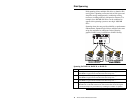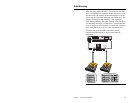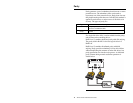
Chapter 2 Introduction to RAID
5
2 Introduction to RAID
RAID (Redundant Array of Independent Disks) is an array
of multiple independent hard disk drives that provide high
performance and fault tolerance. A RAID disk subsystem
improves I/O performance over a computer using only a
single drive. The RAID array appears to the host computer
as a single storage unit or as multiple logical units. I/O is
expedited because several disks can be accessed
simultaneously. RAID systems improve data storage
reliability and fault tolerance compared to single-drive
computers. Data loss because of a disk drive failure can be
recovered by reconstructing missing data from the
remaining data and parity drives.
RAID Benefits
RAID has gained popularity because it: improves I/O
performance, and increases storage subsystem reliability.
RAID provides data security through fault tolerance and
redundant data storage. The ADAC Ultra2 S466
management software configures and monitors RAID disk
arrays.
Improved I/O Although disk drive capabilities have improved drastically,
actual performance has improved only three to four times
in the last decade. Computing performance has improved
over 50 times during the same time period.
Increased Reliability The electromechanical components of a disk
subsystem operate more slowly, require more power, and
generate more noise and vibration than electronic devices.
These factors reduce the reliability of data stored on disks.










